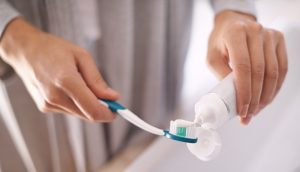 The month of May is dedicated to raising awareness about the dangers of food allergies. As National Food Allergy Month, it helps spotlights the seriousness of food allergies. However, while awareness is raised to the health complications of food allergies, there is often one area that is overlooked. Food allergies can have a significant impact on oral health, increasing the risk for tooth decay and bleeding gums. As your dentist in Bedford, VA, Dr. Ronald Hendricksen wants to help promote your dental health while living with food allergies.
The month of May is dedicated to raising awareness about the dangers of food allergies. As National Food Allergy Month, it helps spotlights the seriousness of food allergies. However, while awareness is raised to the health complications of food allergies, there is often one area that is overlooked. Food allergies can have a significant impact on oral health, increasing the risk for tooth decay and bleeding gums. As your dentist in Bedford, VA, Dr. Ronald Hendricksen wants to help promote your dental health while living with food allergies.
How Do Food Allergies Impact Oral Health?
When living with food allergies, your saliva becomes imbalanced, leading to oral health complications. Despite what many believe, you actually have several different types of saliva in your mouth. Each type plays a vital role in your dental health. However, when food allergies are present, it causes an imbalance between two of the most important types of saliva, mucous and serous.
Mucous is a thick form of saliva, while serous is thin. When your body is battling allergens, it essentially turns off the thin saliva production, which is a natural way for the body to cleanse the teeth. When there is not enough of it, it causes an accumulation of the thicker form of saliva. Increased levels of this saliva increase bacteria accumulation in the mouth. As a result, you developed a heightened risk for developing tooth decay and bleeding gums.
In addition, the medications used to combat allergies can negatively impact your dental health. It is estimated that 80% of allergy medications have a side effect of causing dry mouth. When the mouth becomes dry, it creates the perfect breeding ground for bacteria. This further increases the likeliness for damage to the teeth and gums.
How Can I Protect My Dental Health?
Living with food allergies is a daily struggle. You do not want to further complicate your life with dental problems. There are simple ways you can protect the health of your teeth and gums when coping with food allergies.
You need to maintain proper oral hygiene at home by brushing your teeth twice a day and flossing daily. In addition, limit contact with foods that are known to cause tooth decay, such as those that contain high amounts of sugar and acid.
With thin saliva production low, you need to ensure the mouth remains moist and properly cleansed. Rinse your mouth with water often, or you can use mouth rinses that are specially formulated to help combat dry mouth.
You will also need to maintain your routine dental appointments. With a professional cleaning every 6 months, you will significantly lower your risk for tooth decay and gum disease. During your comprehensive checkup, Dr. Hendricksen will monitor your oral health to detect potential dental problems sooner. With early detection, the right preventive measures can be taken to protect your teeth and gums.
If you are living with food allergies, you need to be proactive to protect your mouth from damage. Contact our office today to schedule a consultation to maintain your dental health.
